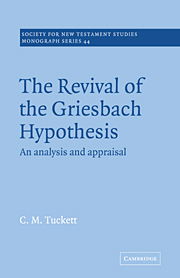Book contents
- Frontmatter
- Contents
- Acknowledgements
- Note on Abbreviations
- Introduction
- Part I Some Aspects of the History of the Study of the Synoptic Problem
- Part II General Phenomena
- Part III Some Particular Texts
- SECTION A SELECTED MARKAN PASSAGES: Introduction
- 9 The Healing of the Man with the Withered Hand
- 10 The Synoptic Tradition on Uncleanness
- 11 The Cleansing of the Temple
- 12 Tribute to Caesar
- 13 The Double Commandment of Love
- 14 The Woes against the Scribes and Pharisees
- 15 The Widow's Mites
- SECTION B THE DOUBLE TRADITION: Introduction
- 16 Wisdom Motifs in the Double Tradition
- 17 The Apocalyptic Discourses
- Conclusion
- Appendix
- Notes
- Abbreviations
- Bibliography
- Index
10 - The Synoptic Tradition on Uncleanness
from Part III - Some Particular Texts
Published online by Cambridge University Press: 18 January 2010
- Frontmatter
- Contents
- Acknowledgements
- Note on Abbreviations
- Introduction
- Part I Some Aspects of the History of the Study of the Synoptic Problem
- Part II General Phenomena
- Part III Some Particular Texts
- SECTION A SELECTED MARKAN PASSAGES: Introduction
- 9 The Healing of the Man with the Withered Hand
- 10 The Synoptic Tradition on Uncleanness
- 11 The Cleansing of the Temple
- 12 Tribute to Caesar
- 13 The Double Commandment of Love
- 14 The Woes against the Scribes and Pharisees
- 15 The Widow's Mites
- SECTION B THE DOUBLE TRADITION: Introduction
- 16 Wisdom Motifs in the Double Tradition
- 17 The Apocalyptic Discourses
- Conclusion
- Appendix
- Notes
- Abbreviations
- Bibliography
- Index
Summary
The lack of any direct Lukan parallel to this pericope means that the discussion about the Synoptic Problem is confined to the question of the relationship between Matthew and Mark. In his discussion of this pericope, Farmer notes the gloss in Mk. vii. 3f., added to explain Jewish customs for Gentile readers, and he puts forward three considerations from which, he claims, ‘it is clear that Mark's version of this tradition is secondary to that of Matthew’. Two of these, as well as his note about Mk. vii. 3f., make implicit appeal to his criterion of ‘Jewishness’. This has been considered earlier in general terms, and the result of that discussion was that no firm decisions could be made on the basis of one tradition being ‘more Jewish’ than a parallel one. A ‘Jewish’ tradition need only imply that an author was part of, and writing for, a community well acquainted with Judaism. Thus when Farmer points to the two lists of vices at the end of the pericope and says that Matthew's is more Jewish and hence the more original, this is by no means a necessary conclusion. It is equally possible that Matthew has altered Mark's list to conform to the commands of the Decalogue. A simple comparison of the contents of the two lists cannot really determine anything about literary priority without further considerations.
It is essentially the same criterion which is being applied when Farmer says that Mark omitted the polemic against the Pharisees (Matt. xv. 12–14), since this meant little for the later Gentile church, whereas, in the early Palestinian church, such hostility would have been very real.
- Type
- Chapter
- Information
- Revival Griesbach Hypothes , pp. 103 - 110Publisher: Cambridge University PressPrint publication year: 1983

